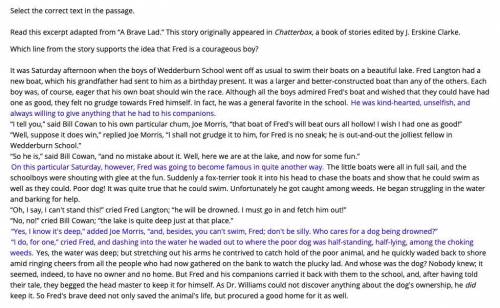
English, 20.11.2020 20:20 4804174946
Select the correct text in the passage.
Read this excerpt adapted from “A Brave Lad.” This story originally appeared in Chatterbox, a book of stories edited by J. Erskine Clarke.
Which line from the story supports the idea that Fred is a courageous boy?
It was Saturday afternoon when the boys of Wedderburn School went off as usual to swim their boats on a beautiful lake. Fred Langton had a new boat, which his grandfather had sent to him as a birthday present. It was a larger and better-constructed boat than any of the others. Each boy was, of course, eager that his own boat should win the race. Although all the boys admired Fred's boat and wished that they could have had one as good, they felt no grudge towards Fred himself. In fact, he was a general favorite in the school. He was kind-hearted, unselfish, and always willing to give anything that he had to his companions.
“I tell you,” said Bill Cowan to his own particular chum, Joe Morris, “that boat of Fred's will beat ours all hollow! I wish I had one as good!”
“Well, suppose it does win,” replied Joe Morris, “I shall not grudge it to him, for Fred is no sneak; he is out-and-out the jolliest fellow in Wedderburn School.”
“So he is,” said Bill Cowan, “and no mistake about it. Well, here we are at the lake, and now for some fun.”
On this particular Saturday, however, Fred was going to become famous in quite another way. The little boats were all in full sail, and the schoolboys were shouting with glee at the fun. Suddenly a fox-terrier took it into his head to chase the boats and show that he could swim as well as they could. Poor dog! It was quite true that he could swim. Unfortunately he got caught among weeds. He began struggling in the water and barking for help.
“Oh, I say, I can't stand this!” cried Fred Langton; “he will be drowned. I must go in and fetch him out!”
“No, no!” cried Bill Cowan; “the lake is quite deep just at that place.”
“Yes, I know it's deep,” added Joe Morris, “and, besides, you can't swim, Fred; don't be silly. Who cares for a dog being drowned?”
“I do, for one,” cried Fred, and dashing into the water he waded out to where the poor dog was half-standing, half-lying, among the choking weeds. Yes, the water was deep; but stretching out his arms he contrived to catch hold of the poor animal, and he quickly waded back to shore amid ringing cheers from all the people who had now gathered on the bank to watch the plucky lad. And whose was the dog? Nobody knew; it seemed, indeed, to have no owner and no home. But Fred and his companions carried it back with them to the school, and, after having told their tale, they begged the head master to keep it for himself. As Dr. Williams could not discover anything about the dog's ownership, he did keep it. So Fred's brave deed not only saved the animal's life, but procured a good home for it as well.


Answers: 2


Other questions on the subject: English

English, 21.06.2019 20:30, destinybowers18
The balance includes both the fees for service and the shipping charges. is this sentence incomplete or complete?
Answers: 1


English, 21.06.2019 23:20, jamalnellum56
What is the moral cf this fable? a. you should play now and worry about provisions later. you should work hard now so someone will you later. you should work hard and save now so you will have something to show for later. you should play hard and work hard now, so you will enjoy life and still have provisions. select the best answer from the choices provided
Answers: 2

English, 22.06.2019 01:30, brandicarney70p8jlsp
Who said this in of pride & prejudice, and what type of irony does it show? “you mistake me, my dear. i have a high respect for your nerves. they are my old friends. i have heard you mention them with consideration these twenty years at least.” a. mrs. bennet: situational irony b. mr. bingley: dramatic irony c. elizabeth: proverbial irony d. mr. bennet: verbal irony
Answers: 1
You know the right answer?
Select the correct text in the passage.
Read this excerpt adapted from “A Brave Lad.” This story or...
Questions in other subjects:

Mathematics, 25.01.2021 20:30






SAT, 25.01.2021 20:30






